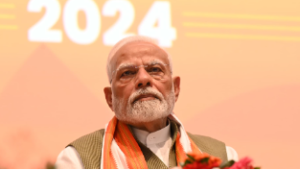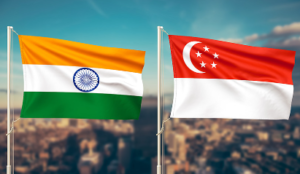Key Points:
- Singapore is India’s sixth-largest trading partner and the leading source of foreign direct investment.
- Indian Prime Minister Narendra Modi’s visit to Singapore aims to strengthen ties in finance, technology, and business.
- Modi’s recent international visits highlight India’s growing global influence and strategic priorities.
India-Singapore Relations: Strengthening Strategic Partnerships
Indian Prime Minister Narendra Modi is set to visit Singapore this week, marking his first trip to the city-state since winning a historic third term in June 2024. This visit is expected to solidify India-Singapore relations, ushering in a new era of bilateral agreements, particularly in finance, technology, and manufacturing.
Singapore is India’s sixth-largest trading partner, accounting for 3.2% of India’s overall trade. In the fiscal year 2024, India imported $21.2 billion worth of goods from Singapore, while exports totaled $14.4 billion. Moreover, Singapore remains the top source of foreign direct investment (FDI) into India, with cumulative FDI inflows reaching nearly $160 billion from April 2000 to March 2024.
Modi’s High-Profile Agenda in Singapore
During his two-day visit, Modi will meet with several key Singaporean leaders, including Prime Minister Lawrence Wong, President Tharman Shanmugaratnam, Senior Minister and former Prime Minister Lee Hsien Loong, and Emeritus Senior Minister Goh Chok Tong. These meetings are expected to lead to significant developments in India-Singapore relations, with a strong focus on finance and technology.
“The India-Singapore relationship has always been stable and strong. It is now expected to move to the next phase of collaboration, which will be both an economic and strategic partnership based on areas of long-term interest,” said Amitendu Palit, a senior research fellow at the Institute of South Asian Studies.
Economic and Strategic Collaborations
Modi’s visit to Singapore follows his historic trip to Brunei, where he became the first Indian Prime Minister to make a bilateral visit to the Southeast Asian nation. In Brunei, Modi inaugurated the new Chancery premises of the High Commission of India and visited the iconic Omar Ali Saifuddien Mosque.
In Singapore, the discussions are likely to emphasize enhancing economic cooperation, particularly in semiconductor manufacturing—a sector where Singapore plays a crucial role globally. Last month, Indian ministers, including Finance Minister Nirmala Sitharaman and Minister of External Affairs S. Jaishankar, attended a ministerial roundtable in Singapore to explore bilateral cooperation in advanced manufacturing, trade, investment, and digitalization.

Advancing Technology and Finance Initiatives
One of the significant outcomes of the India-Singapore partnership has been the successful integration of Singapore’s PayNow with India’s Unified Payments Interface (UPI) in 2023, facilitating real-time fund transfers between bank accounts in both countries. Experts predict that similar initiatives could be announced during Modi’s visit, further embedding technology and finance collaboration into the bilateral relationship.
“The first step of cooperation will be firmly embedded in the upcoming meeting,” predicted Palit. While major trade announcements are not expected, the trade relationship between India and Singapore remains robust, with Singapore serving as a critical gateway for India into the Asia-Pacific and Southeast Asia regions.
India’s Expanding Global Influence
Modi’s visit to Singapore is part of a broader strategy to enhance India’s global influence. Since his reelection, Modi has undertaken several high-profile international visits, including to Italy, Russia, Ukraine, and Poland. These visits underscore India’s ambition to play a more significant role in global affairs and forge strategic partnerships across various regions.
As Modi prepares for his meetings with Singapore’s top leaders, the world is watching closely, anticipating the next steps in strengthening the strategic partnership between India and Singapore.
1. Importance of Singapore-India Relations
- Trade and Investment: Singapore is a vital trading partner for India, contributing significantly to India’s overall trade. In the fiscal year 2024, Singapore was India’s sixth-largest trading partner, with imports from Singapore amounting to $21.2 billion and exports reaching $14.4 billion. Moreover, Singapore is the top source of foreign direct investment (FDI) into India, with cumulative FDI inflows of nearly $160 billion from April 2000 to March 2024. This represents almost a quarter of India’s total FDI inflows during this period.
- Economic Collaboration: The relationship between India and Singapore is not just about trade; it also involves significant economic collaborations, particularly in sectors like finance, technology, and manufacturing. For instance, the integration of Singapore’s PayNow with India’s Unified Payments Interface (UPI) in 2023 has enabled real-time fund transfers between bank accounts in both countries, showcasing the deepening financial ties.
- 2. Modi’s Diplomatic Strategy
- Global Outreach: Modi’s visit to Singapore is part of a broader diplomatic strategy to enhance India’s global influence. Since his reelection, Modi has visited several countries, including Italy, Russia, Ukraine, Poland, and Brunei. These visits highlight India’s ambition to strengthen bilateral relations and build strategic partnerships across various regions.
- Southeast Asia Focus: Modi’s visit to Singapore is particularly significant as it reflects India’s focus on Southeast Asia. Singapore is a strategic partner for India in the region, and this visit aims to reinforce the partnership. Modi’s recent visit to Brunei, where he became the first Indian Prime Minister to make a bilateral visit, further underscores this regional focus.
- 3. Expected Outcomes of the Visit
- Bilateral Agreements: The visit is expected to result in the signing of several bilateral agreements, particularly in finance, technology, and manufacturing. Singapore has been a stable and strong partner for India, and this visit is expected to move the relationship to the next phase of collaboration. Political analysts anticipate that any outcomes from recent ministerial meetings between Indian and Singaporean ministers will be formalized during Modi’s visit.
- Technology and Finance Initiatives: One of the key areas of focus during the visit will be technology and finance. Singapore’s expertise in semiconductor manufacturing is particularly of interest to India, as it seeks to bolster its own capabilities in this sector. The ongoing cooperation between the two countries in digital payments and financial technology is also expected to be further strengthened.
- 4. Broader Implications for India’s Foreign Policy
- Strategic Partnerships: Modi’s visit to Singapore is part of a broader effort to establish and strengthen strategic partnerships with key countries around the world. By focusing on Southeast Asia, Modi is signaling India’s intention to play a more prominent role in the region’s economic and strategic landscape.
- India’s Global Role: The visit also underscores India’s growing role on the global stage. As Modi engages with world leaders and builds stronger bilateral relationships, India is positioning itself as a key player in global affairs, particularly in areas such as finance, technology, and manufacturing.

